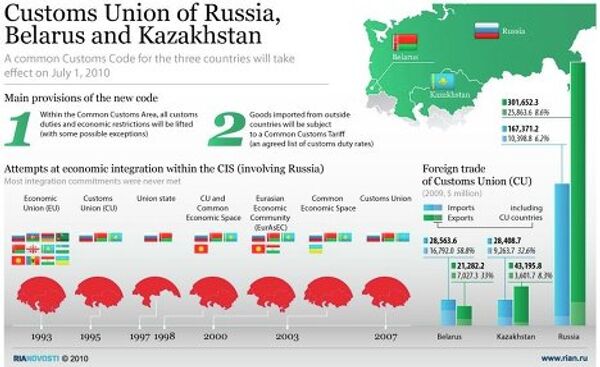TASHKENT, November 12 (RIA Novosti) – A senior official in Uzbekistan on Tuesday expressed unusual, if cautious, support for the prospect of his Central Asian nation joining a Russia-led trade bloc.
Uzbekistan has for many years resisted full participation in economic and military regional alliances, in particular those dominated by its former Soviet overlord.
Senate speaker Ilgizar Sobirov told journalists during a press conference after a meeting with his visiting Russian counterpart that Uzbekistan was positively disposed to joining the Customs Union, which currently also comprises Kazakhstan and Belarus.
Russian Senate speaker Valentina Matviyenko said she had sensed interest from Uzbekistan on further cooperation with the Customs Union.

“Our brothers in Uzbekistan, with whom we are so bonded … are of course interested in working in this market,” she told reporters.
Matviyenko said that any developments ahead would be slow.
“There is no need to hurry, there is no need to pressure anybody,” she said. “Every country is sovereign, it can decide what is beneficial and in the interests of its government and its people.”
Leonid Savin, editor of international affairs magazine Geopolitika, told the Voice of Russia radio station that Uzbekistan’s regime is structured in such a way that Sobirov was unlikely to express himself as he did unless it reflected the government’s position.
“Uzbekistan’s economy is in many ways dependent on Russia as far as exports go. On the other hand, [Russia] could be a good market for the sale of cotton from Uzbekistan,” Savin told Voice of Russia.
A large number of Uzbek nationals live in Russia for employment, which is often lacking back home.
In a further signal of opening to Russia, Sobirov said Uzbekistan would create every condition to attract Russian investors.
Sobirov said the two countries needed to revise economic and business agreements.
“It is necessary to harmonize existing documents,” he said.
Matviyenko said that Russian companies have invested more than $6 billion in Uzbekistan over the past five years.
Despite the warm words Tuesday, ties between the two countries have been strained in recent years.
Uzbekistan has bridled at Moscow’s regular efforts to build up its military influence over the region.
In mid-2012, Uzbekistan pulled out of the Collective Security Treaty Organization, a military alliance built along the lines of NATO that draws together several post-Soviet states.
One of the biggest investors in Uzbekistan, Russian-owned telecommunications giant MTS, last year found its subsidiary being squeezed out after a series of financially punitive government investigations that the company described as a “shakedown.”
In the wake of the terrorist attack on the United States in 2001 and the subsequent military campaign in Afghanistan, Tashkent turned to the West.
Uzbekistan’s border with Afghanistan has given it a valuable strategic role and the densely populated country of 30 million people has latterly served as a conduit through which the United States and its allies are drawing out their military equipment.
Criticisms over the country’s poor human rights from the United States and European Union members has led to a gradual cooling in ties, forcing Uzbekistan to seek more intense relationship with, among other nations, China.


